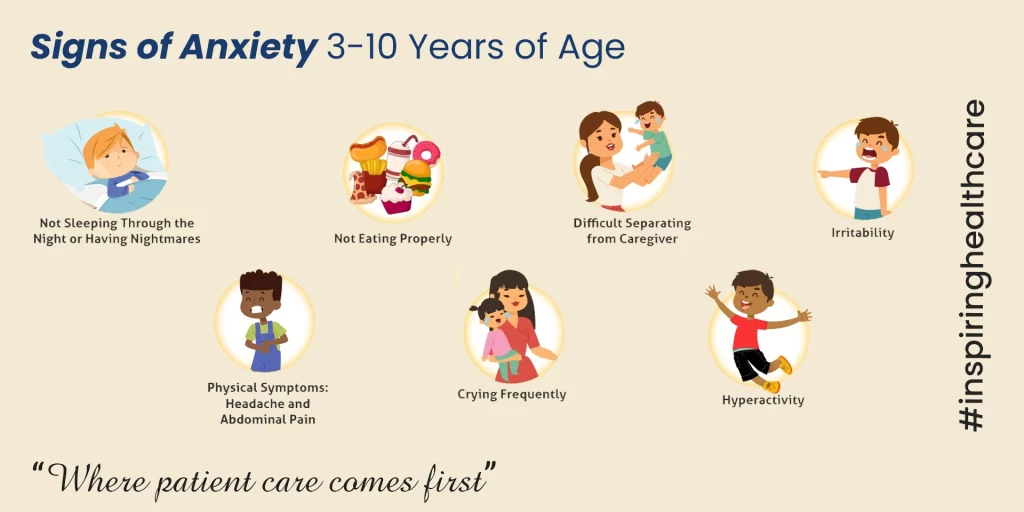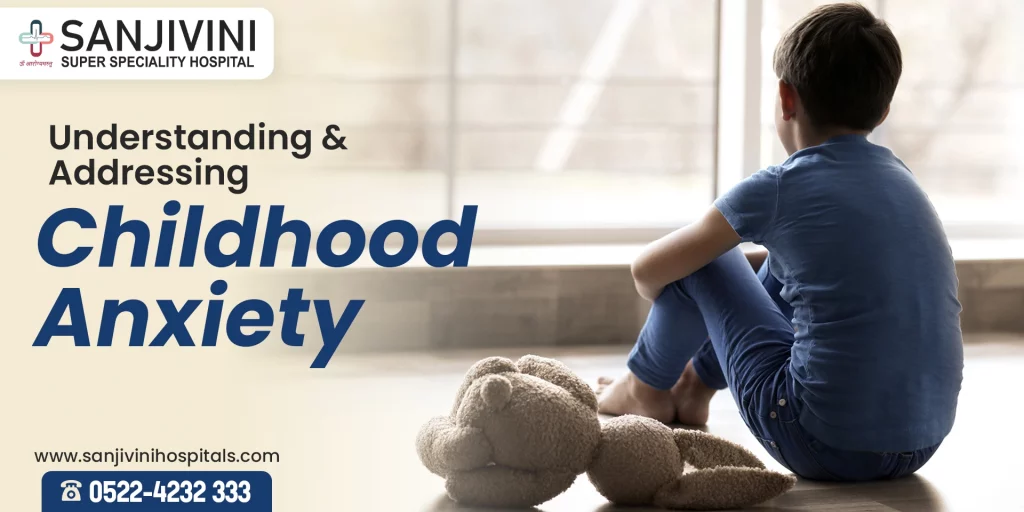Childhood is meant to be a time of joy, discovery, and boundless imagination. However, for many children, it can also be a period marked by overwhelming anxiety and fear. It is an uncomfortable response to the perception of danger. It is a normal human emotion but when it is excessive or developed in an appropriate & causes desires in a child then we call it Anxiety Disorder. Childhood anxiety disorders are more common than one might think, affecting approximately one in every eight children. These disorders can manifest in various forms, from generalized worries about everyday life to specific fears that disrupt daily functioning.
In this blog, we will explore the intricacies of childhood anxiety, including its different types, common symptoms, and underlying causes. We will delve into the effects of anxiety on children’s lives, both in the short and long term. Additionally, we will provide practical strategies and tips for parents to help their anxious children, from recognizing signs of anxiety to creating a supportive environment at home.
Also Read: Signs of Learning Disabilities in Kids: What Parents Need to Know
Types of childhood anxiety disorders
Childhood anxiety disorders encompass four main types:
- Generalized Anxiety Disorder (GAD): Characterized by excessive worry about various aspects of life.
- Separation Anxiety Disorder: Involves significant fear and distress when separated from home or caregivers.
- Social Anxiety Disorder: This results in an overwhelming fear of rejection or embarrassment in social situations.
- Specific Phobias: Intense, irrational fears of specific objects or situations.
Common symptoms of childhood anxiety
- Childhood anxiety often presents itself through various symptoms, which can be broadly categorized into physical, emotional, and behavioral manifestations.
- Physical symptoms may include stomachaches, headaches, nausea, vomiting, shortness of breath, increased heart rate, sweating, shaking, and disrupted sleep patterns.
- Emotional indicators may involve feelings of fear, panic, embarrassment, or shame. Children may also experience emotional outbursts like crying, irritability, or a sense of hopelessness.
- Behavioral cues might include avoidance behaviors, increased dependence on caregivers, refusal to attend school, frequent complaints about physical discomfort, excessive worry about sleeping away from home, and changes in eating and sleeping habits.
- Parents and caregivers must recognize these symptoms and seek professional assistance if they persistently affect the child’s daily life. Early intervention can make a significant difference in managing childhood anxiety and promoting overall well-being.

Factors contributing to childhood anxiety
- Childhood anxiety arises from multiple factors, including genetics, environment, trauma, and parental influence.
- Genetics can predispose children to anxiety, as they may inherit a tendency from their parents.
- Environmental stressors like frequent moves, bullying, or abuse can trigger anxiety in children.
- Traumatic events such as parental divorce or the loss of a loved one can also induce anxiety.
- Parental anxiety disorders and anxious behaviors can be passed on to children.
- Seeking professional help is essential for severe or persistent anxiety in children, as early intervention and treatment can greatly benefit them.
Effects of Childhood Anxiety
Childhood anxiety can bring about several immediate impacts on a child’s life, including:
- Academic performance: Anxiety may hinder a child’s ability to concentrate, making it challenging for them to focus on school tasks and excel academically. Additionally, anxious children may struggle with attending classes regularly and participating in school activities.
- Social relationships: Anxiety can disrupt a child’s social interactions, making it difficult for them to initiate and sustain friendships. Symptoms like shyness, avoidance of social situations, or reluctance to attend school can hinder their social development.
- Physical health: Anxiety often manifests in physical symptoms like stomachaches, headaches, and sleep disturbances, affecting a child’s overall physical well-being.
Parents and caregivers must recognize these effects and seek professional assistance if they notice persistent symptoms that interfere with the child’s daily life. Early intervention and appropriate treatment can help alleviate these immediate effects and prevent long-term consequences.
Building resilience in children
To foster resilience in children, various techniques can be utilized. These include teaching coping mechanisms, promoting relaxation practices, and advocating for a healthy lifestyle. Here are some proven methods to nurture resilience in children:
Teaching coping skills: Parents can assist children in recognizing and labeling their emotions, understanding what triggers those feelings, and linking them to specific coping strategies. This may involve validating their emotions, providing age-appropriate information, and encouraging problem-solving for various challenges.
Encouraging relaxation techniques: Establishing consistent routines can help children effectively manage stress, providing a sense of stability during turbulent times. Prioritizing physical well-being, such as ensuring sufficient sleep, maintaining a balanced diet, and engaging in regular physical activity, also contributes to resilience.
Promoting a healthy environment at home Fostering moments of joy, commemorating milestones, and highlighting children’s strengths are essential for building resilience. Additionally, involvement in activities that connect families to wider communities, whether social, cultural, or religious, can foster a sense of belonging and security.
By implementing these approaches, parents and caregivers can significantly influence children’s resilience development, equipping them with the tools to navigate stress, anxiety, and uncertainty effectively.
When do I need to go back to the doctor?
If your child’s anxiety persists or worsens, it’s time to reconnect with the doctor. Collaborate with the doctor to explore new approaches or strategies tailored to your child’s needs. Book your consultation at Sanjivini Super Speciality Hospital Lucknow
It’s crucial to consult your child’s doctor if:
- Your child exhibits additional behavior issues, like increased shyness.
- There are significant life events, such as a family member’s injury or death, that may exacerbate your child’s anxiety.
- You suspect your child’s anxiety is impacting other health conditions, like worsening asthma symptoms.
The doctor can also assist in determining whether a specialist consultation is beneficial. For instance, cognitive behavioral therapy is often effective for children grappling with anxiety.

